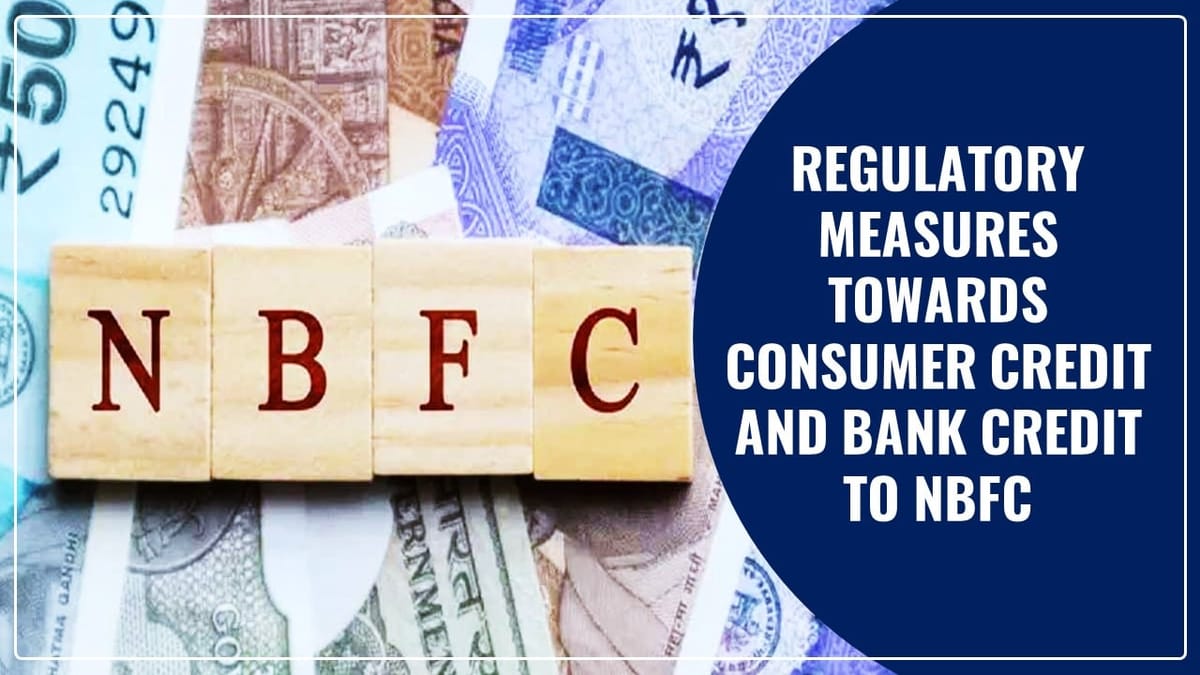The Reserve Bank of India (RBI) strengthened the restrictions for consumer lending and bank credit to non-banking financial companies (NBFCs), according to a notification issued.
Reetu | Nov 18, 2023 |

RBI fastens Regulatory measures towards consumer credit and bank credit to NBFC
The Reserve Bank of India (RBI) strengthened the restrictions for consumer lending and bank credit to non-banking financial companies (NBFCs), according to a notification issued.
Refer to the Governor’s Statement released in October 2023, flagging the high growth in certain components of consumer credit and advising banks and non-banking financial companies (NBFCs) to strengthen their internal surveillance mechanisms, address the build-up of risks, if any, and institute suitable safeguards, in their own interest.
The Governor also mentioned the strong rise in consumer credit and NBFCs’ rising reliance on bank borrowings in his engagements with MD/CEOs of major banks and large NBFCs in July and August 2023, respectively.
In this context, it has been decided to effect the following measures as under:
(a) Consumer credit exposure of commercial banks
As per extant instructions applicable to commercial banks1, consumer credit attracts a risk weight of 100%. On a review, it has been decided to increase the risk weights in respect of consumer credit exposure of commercial banks (outstanding as well as new), including personal loans, but excluding housing loans, education loans, vehicle loans and loans secured by gold and gold jewellery, by 25 percentage points to 125%.
(b) Consumer credit exposure of NBFCs
In terms of extant norms, NBFCs’ loan exposures generally attract a risk weight of 100%2. On a review, it has been decided that the consumer credit exposure of NBFCs (outstanding as well as new) categorised as retail loans, excluding housing loans, educational loans, vehicle loans, loans against gold jewellery and microfinance/SHG loans, shall attract a risk weight of 125%.
(c) Credit card receivables
As per extant instructions, credit card receivables of scheduled commercial banks (SCBs) attract a risk weight of 125%3 while that of NBFCs attract a risk weight of 100%4. On a review, it has been decided to increase the risk weights on such exposures by 25 percentage points to 150% and 125% for SCBs and NBFCs respectively.
In terms of extant norms, exposures of SCBs to NBFCs, excluding core investment companies, are risk weighted as per the ratings assigned by accredited external credit assessment institutions (ECAI)5. On a review, it has been decided to increase the risk weights on such exposures of SCBs by 25 percentage points (over and above the risk weight associated with the given external rating) in all cases where the extant risk weight as per external rating of NBFCs is below 100%. For this purpose, loans to HFCs, and loans to NBFCs which are eligible for classification as priority sector in terms of the extant instructions shall be excluded.
(a) The REs shall review their extant sectoral exposure limits for consumer credit and put in place, if not already there, Board approved limits in respect of various sub-segments under consumer credit as may be considered necessary by the Boards as part of prudent risk management. In particular, limits shall be prescribed for all unsecured consumer credit exposures. The limits so fixed shall be strictly adhered to and monitored on an ongoing basis by the Risk Management Committee.
(b) All top-up loans extended by REs against movable assets which are inherently depreciating in nature, such as vehicles, shall be treated as unsecured loans for credit appraisal, prudential limits and exposure purposes.
The aforesaid instructions have been given in exercise of the authorities granted by Sections 21 and 35A of the Banking Regulation Act, 1949; Chapter IIIB of the Reserve Bank of India Act, 1934; and Sections 30A, 32, and 33 of the National Housing Bank Act, 1987.
The above instructions, other than paragraph 2C(a), shall come into force with immediate effect. All REs shall endeavour to comply with the provisions at paragraph 2C(a) at the earliest, but in any case shall implement them by no later than February 29, 2024.
In case of any Doubt regarding Membership you can mail us at contact@studycafe.in
Join Studycafe's WhatsApp Group or Telegram Channel for Latest Updates on Government Job, Sarkari Naukri, Private Jobs, Income Tax, GST, Companies Act, Judgements and CA, CS, ICWA, and MUCH MORE!"